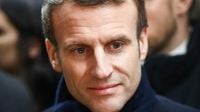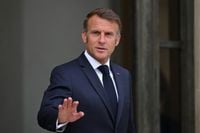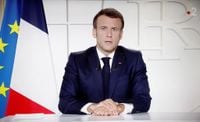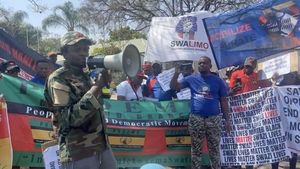On September 22, 2025, France is set to formally recognize the State of Palestine at the United Nations General Assembly (UNGA) in New York, a move that President Emmanuel Macron has described as a pivotal step in advancing peace in the Middle East. The announcement, which Macron confirmed just days earlier, has sent ripples through diplomatic circles and ignited passionate debate at home and abroad, underscoring both the promise and the complexity of this historic decision.
According to RIA Novosti, President Macron reiterated his intention to recognize Palestine during a call with Palestinian Authority President Mahmoud Abbas on September 19. "I have just spoken with the President of the Palestinian Authority Mahmoud Abbas… I reiterated to President Abbas my intention to recognise the State of Palestine on Monday in New York," Macron wrote on X, the platform formerly known as Twitter. This dramatic declaration aligns with France’s longstanding commitment to a two-state solution as the pathway to a just and lasting peace between Israelis and Palestinians.
The 80th session of the UN General Assembly, which opened on September 9, will feature general debates from September 23 to September 27 and again on September 29. France’s recognition of Palestine is expected to be a centerpiece of these discussions, with Macron and Saudi Crown Prince Mohammed bin Salman co-chairing a high-level meeting to rally international support for the two-state solution. Macron emphasized the significance of this gathering, stating on X, “The adoption by 142 countries of the (July) New York Declaration on the two-state solution marked a turning point in charting a path toward lasting peace and security in the Middle East.”
While Macron’s initiative has garnered praise from some quarters, it is not without controversy. According to Politico, Israel is preparing retaliatory measures in response to France’s anticipated recognition of Palestine. Israeli Foreign Minister Gideon Sa'ar, in early September, urged France to abandon what he called the "unilateral recognition" of Palestine, warning that President Macron would not be welcome in Israel as long as this plan remained on the agenda. The diplomatic tension highlights the deep divisions that persist over the Israeli-Palestinian conflict, divisions that France’s move is unlikely to resolve overnight.
Domestically, Macron faces significant opposition to his plan. A survey published by the council representing Jewish organizations in France on September 20 found that 71% of French citizens oppose the immediate recognition of a Palestinian state before the release of hostages and the surrender of Hamas. Only 29% expressed support for immediate recognition. The survey also revealed broader anxieties: 68% of respondents see antisemitic acts as a threat not just to Jews but to French society as a whole, while 19% consider actions against Jews over the Gaza conflict to be legitimate—a figure that rises to 31% among 18- to 24-year-olds.
Against this backdrop of public unease, Macron has moved to address concerns about rising antisemitism. On September 20, the president ordered the Minister of Justice to strengthen the response to antisemitism and its new forms. He acknowledged the deep anxieties of French Jews, noting, "Anxiety, loneliness, fear: this week they told me again how much their lives have changed since October 7. They also told me about their demand for justice and protection." Macron stressed the need for "absolute vigilance and immediate response to identify and very severely punish those guilty of antisemitic acts," assuring the public, "In the face of hatred, the last word will always be with the Republic. The nation will always be mobilized."
Macron’s diplomatic push comes amid a rapidly shifting international landscape. Around three-quarters of UN member states already recognize Palestine, and in 2024, Ireland, Spain, and Norway formalized their recognition. The French president is now seeking to gather a coalition of Western countries—including the United Kingdom, Belgium, Portugal, Luxembourg, Malta, Andorra, Australia, and Canada—to join France in recognizing Palestine. One French official, quoted by Politico, described the initiative as a "diplomatic victory" for Paris. However, major European powers such as Germany and Italy have declined to join, and there is little hope that the move will sway U.S. President Donald Trump or Israeli Prime Minister Benjamin Netanyahu to change course on the ongoing war in Gaza.
The war itself remains a grim backdrop to these diplomatic maneuvers. UN investigators recently concluded that Israel is committing genocide in Gaza, where the death toll has reportedly surpassed 65,000. The urgency of ending the violence and addressing the humanitarian crisis is never far from Macron’s rhetoric. As he declared two months ago, "France remains faithful to its historic commitment to a just and lasting peace in the Middle East. I have decided that France will recognize the State of Palestine. I will make a ceremonial announcement at the United Nations General Assembly in September. The urgent need today is to end the war in Gaza and to save the civilian population."
The upcoming conference in New York is, in Macron’s words, a crucial moment to "take a further step in mobilizing the international community." He continues to champion the principle of "two peoples, two states, peace and security for all" as the foundation for a future settlement. Yet, as Politico notes, the limits of what Macron can achieve are clear. While the recognition of Palestine by France and a handful of allies may represent a symbolic victory, it is unlikely to deliver an immediate breakthrough in the conflict or fundamentally alter the positions of the main actors on the ground.
Still, symbolism can matter in international relations, and Macron’s gamble is that a coordinated Western recognition of Palestine will help shift the terms of debate, both at the UN and beyond. Whether this bold diplomatic move leads to tangible progress or simply entrenches existing divisions remains to be seen. For now, the world will be watching New York on September 22, as France takes center stage and stakes its claim as a champion of peace in one of the world’s most intractable conflicts.
As the debates unfold and the diplomatic chessboard shifts, the stakes—both for the Middle East and for France itself—could hardly be higher.






